The Checker Maven
The World's Most Widely Read Checkers and Draughts Publication
Bob Newell, Editor-in-Chief
Published each Saturday morning in Honolulu, Hawai`i
Contests in Progress:
Remarkable, Indeed
In January we presented a mind-boggler of a stroke problem (click here to see it again). This month, we offer another brain-twister of a different nature. Take a look at the situation diagrammed below, titled Remarkable Block Problem and attributed to an author calling himself "X.Y.Z."
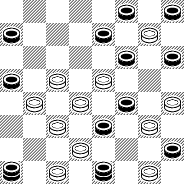
WHITE
White to Move and Win
It all reminds us of Crowther's original Adventure game in which "you're in a maze of twisty passages..." But that was "XYZZY", not "X.Y.Z."
And, by the way, did you try to get your computer to solve this one? It's doubtful that any computer program would be able to come up with the solution. Click on Read More for some supplementary discussion on why this might be.
[Read More]Happy 90th Birthday, Mr. Richard Fortman!

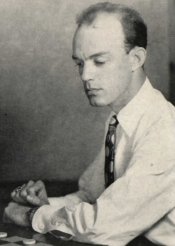
Marujito: A New Checker Playing Engine

As those of you know who follow my checker program review page, I test nearly all new programs against Martin Fierz's Simple Checkers, an engine that I rate as "Class C" meaning it plays a good casual game, if short of expert or master level. Simple generally destroys the competition as, alas, the majority of checker programs out there aren't all that great.
Well, this new kid on the block is no comical bird, despite its name. Marujito clearly outplayed Simple Checkers in a test game! The game was a very interesting matchup, with Marujito calculating a pretty way to win a piece and then correctly winning a 3 kings vs. 2 kings endgame--- something that the more basic programs very often fail to do.
You can view the full game in animated form, with comments and evaluations, here. But before you do that, take a look at this position:

BLACK (Marujito)
Black to Play and Win
The Checker Maven congratulates program author Angel Galan Galan on turning out a checker engine that plays a very good game and will be a lot of fun to use as a casual sparring partner.
A summary review of Marujito now appears on the review page.
Who Was That Masked Man?
1. Solve the problem (of course).
2. Identify the person in the photo (on the left), who is the problem's compositor. You can click on the photo for a full-size version.
February's entry will be what will probably turn out to be the easiest of the three, at least in terms of identifying the person in the photo; we're not so sure about the problem itself! Here it is:
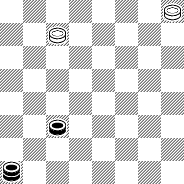
BLACK
Black to Play and Win
Are You Faster Than the World Champion?

Can you beat the World Champion? The clock is ticking!
(The Maven thanks Brian Hinkle for sending this one along.)
Now click here to see the animated solution. Did you beat the Champion? Record your results here.
Solutions and Follow-Ups from January, 2005
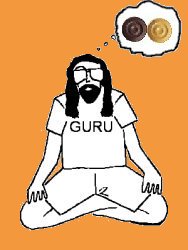
Also last month, we updated our review of the Blondie24 computer program. Click on the link, and then take a look at the animated game between Blondie and Simple Checkers to see how surprisingly well these two fare over the board.
And finally, we've done a complete rewrite of our article, So This Is Checkers?, as we've come across a lot of supplementary information about interesting checker variants both old and new.
The Little Fooler
The feature problem for February is entitled The Little Fooler and is credited to Tom Wiswell and Jimmy Ricca. No less an authority than Ben Boland himself called this "a fine original problem." Skilled solver Brian Hinkle took almost a month to crack it.
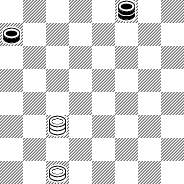
WHITE
White to Play and Win
Give this gem a really good try; your efforts will be well rewarded. After you've tried it, vote on how hard you thought it was, and click on Read More for the elegant solution.
[Read More]Speed Department

How quickly can you solve these? A timer is running while you work! Click "Got It!" when you've figured it out and you'll see exactly how long it took.
Click Read More to check your solution.
These problems are provided courtesy of a gentleman named Charles, who in 2005 is celebrating his 60th year playing the Grand Old Game. He can be found on the GoldToken game site under the name NATONE. Look him up and play a friendly game or two.
Now: ready, get set, GO!
No. 1 (easy)
No. 2 (very easy)
[Read More]But the Computer Says......
Here's a problem attributed to O. H. Richmond, and published a little over 50 years back by Tom Wiswell. He called it "Black Beauty":
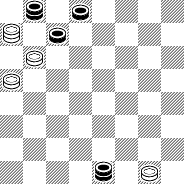
WHITE
Black to Play and Win
Now, you'll surely find that this is a neat problem and a "real twister" as Wiswell would say. So solve it, check your solution with the animation here, and then click on Read More to find out what the computer has to say about this problem. It won't be what you think--- or will it?
[Read More]Major Update to Program Reviews
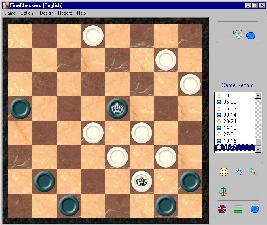
The Checker Maven is produced at editorial offices in Honolulu, Hawai`i, as a completely non-commercial public service from which no profit is obtained or sought. Original material is Copyright © 2004-2024 Avi Gobbler Publishing. Other material is the property of the respective owners. Information presented on this site is offered as-is, at no cost, and bears no express or implied warranty as to accuracy or usability. You agree that you use such information entirely at your own risk. No liabilities of any kind under any legal theory whatsoever are accepted. The Checker Maven is dedicated to the memory of Mr. Bob Newell, Sr.


